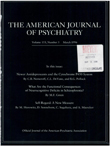Psychotic unipolar depression at follow-up: factors related to psychosis in the affective disorders
Abstract
OBJECTIVE: The current research was designed to investigate the relationship between affective disruption and psychosis in unipolar major depressive disorder and to evaluate whether some depressed patients are particularly vulnerable to subsequent psychosis. METHOD: A group of 31 psychotic and 63 nonpsychotic inpatients with unipolar depression were assessed during hospitalization and then prospectively assessed for depressive and psychotic symptoms 2.4 years after hospital discharge. RESULTS: The psychotic depressed inpatients had significantly higher rates of psychosis during the posthospital period, 2.4 years later, than the originally nonpsychotic depressed inpatients. However, they did not have higher rates of depressive syndromes during the posthospital period. Psychosis during the posthospital period was significantly related to recurrent or persistent affective disruption. The posthospital depressive syndromes of the initially psychotic depressed inpatients tended to be slightly more severe than those of the initially nonpsychotic depressed inpatients. Despite this, psychosis during the inpatient period was more predictive of posthospital psychosis than the severity of the posthospital depressive syndrome. CONCLUSIONS: The interaction of the following two factors was proposed to be central to psychotic depression: 1) a vulnerability to psychosis, and 2) concurrent affective disruption.
Access content
To read the fulltext, please use one of the options below to sign in or purchase access.- Personal login
- Institutional Login
- Sign in via OpenAthens
- Register for access
-
Please login/register if you wish to pair your device and check access availability.
Not a subscriber?
PsychiatryOnline subscription options offer access to the DSM-5 library, books, journals, CME, and patient resources. This all-in-one virtual library provides psychiatrists and mental health professionals with key resources for diagnosis, treatment, research, and professional development.
Need more help? PsychiatryOnline Customer Service may be reached by emailing [email protected] or by calling 800-368-5777 (in the U.S.) or 703-907-7322 (outside the U.S.).



